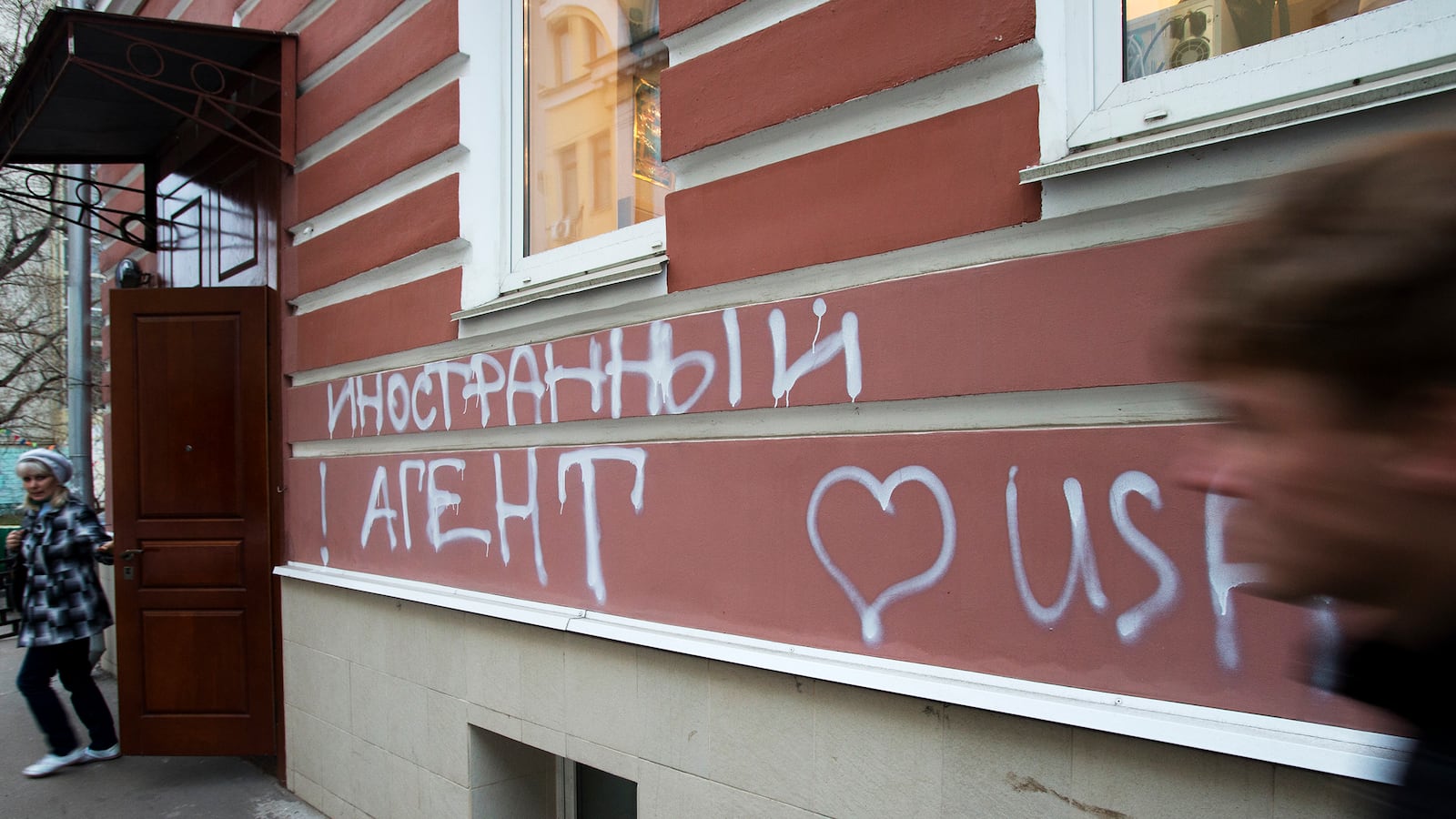
On their way to work, activists of Russia’s oldest and biggest human-rights group, Memorial, discovered a sign painted on the wall of their office building, saying “Foreign agent [hearts] USA”. The painted words were accompanied by multiple “Foreign agent” stickers, pasted to the wall.
The activists took photos of the wall, sighed, and shook their heads: a new law obliging all Russian NGOs working on foreign grants to register as foreign agents took effect Wednesday morning. Memorial, a Nobel Prize nominee for six years in a row, was on a list of more than a thousand NGOs that needed to register.
During the last two decades, since the day Mikhail Gorbachev agreed with Soviet dissidents to register Memorial as the first NGO in the Soviet Union, the group has been faithful to its mission of documenting and rehabilitating victims of repression—studying the series of mass human-rights violations by authorities of both the U.S.S.R. and modern Russia. As a part of its de-Stalinization program, Memorial distributes video stories on DVDs to history classrooms describing the stories of some of the 2.5 million executed victims of Stalin’s repressions. “I'd like to call you all by name,” the Soviet modernist poet Anna Akhmatova once wrote, about Stalin’s victims. Memorial is doing that job.
The group’s most recent book, Fate is Unknown, describes the violations committed during Vladimir Putin’s 12-year era. It is a record, documented in detail, of abductions and disappearances of Russian citizens living in Chechnya. So far, Memorial’s researchers have analyzed more than 3,000 human fates; about 2,000 more cases remain in their files, to be looked into, they say.
The signs on the wall did not surprise Oleg Orlov, the director of Memorial’s crisis research project. Earlier this week, the pro-Kremlin Young Russia movement announced the attack: the movement’s website invited activists to join an action it called Come Out of Twilight. Activists with flashlights should illuminate “vampires—foreign agents.” The paint on the building appeared during this campaign. “I just laughed when I saw them outside our office Wednesday morning; they were a small group of maybe 20 kids with flashlights,” the executive director of Transparency International, Yelena Panfilova, said about the street action by the pro-Kremlin youth outside her office. But at Memorial, people felt upset. “My heart hurts for our old dissidents, whom the KGB accused as ‘people’s enemies’—they had a traumatizing flashback today,” Orlov said.
Later in the day, dozens of one-time Soviet dissidents gathered at Memorial for their weekly meetings. To many, that was the only opportunity to receive financial or legal support. Many said they felt angry reading the sign painted on the wall. “I normally do not curse, but what else can we call these fake patriots but bastards!” said Turana Varazhbetyan, 78, who sounded upset. Her family was exiled to the Altai region in 1949 for her father’s previous visits to Turkey. Varazhbetyan got separated from her parents, and was raised by a kind-hearted stranger until Stalin died and the family could return home to Moscow.
Such stories exist by the millions. “If the country’s leader did not approve these disgraceful actions, they would not have dared to say anything bad about Memorial, Russia’s pride, and the people’s defender,” Varazhbetyan said.
Memorial’s official statement condemned the new law about foreign agents as “illegitimate and amoral.” And the organization once inspired by academic Andrei Sakharov confirmed its official position: “We are not going to register as ‘foreign agents,’” Memorial said in a statement on its website. It called the sign on its wall “an intentional insult to the memory of millions who died in the Gulag.” As on any normal day, Memorial’s activists worked until late. Archivists gathered information for the next day—about 20 people were coming to look for beloved ones, who disappeared during Soviet repressions. The group’s legal department helped clients write applications to the European Court of Human Rights in Strasburg. And north Caucasus experts Oleg Orlov and Alexander Cherkasov worked on this week’s cases of Muslims detained in Moscow.
Emails kept coming: somebody wrote of one more abduction case in Dagestan, where 824 people were killed last year. Memorial’s researchers work without any protection in Russia’s most unstable republics of Chechnya, Dagestan, Ingushetia, and Kabardino-Balkaria. They stay in tiny apartments and often borrow money from each other to pay their daily expenses.
With USAID leaving Russia, Memorial will have to cut financing for some of its key educational and human-rights projects. If the group obeys the law, authorities could harass “foreign agents,” the activists believe. If they choose civil protest and don’t follow the law, they’ll have to pay a fine of more than $10,000, or take the state to court in Russia.
“No doubt, we’ll continue defending people’s rights,” the chairman of Memorial international, Arseny Roginsky, said with a sigh. “It is just frustrating that now we have to waste time on dealing with annoying legal procedures—and on cleaning our walls.”





